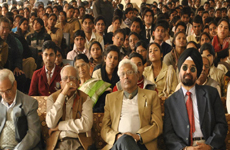Section 72 of the MCS Act 1960 declares “Subject to the provisions in this Act and the rules, the final authority of every society shall vest in the general body of members in general meeting, summoned in such a manner as may be specified in the by-laws.” This statutory declaration brings out critical requirement of members casting their votes on matters put up for their decision in general body meetings.
The general body meeting must have been convened in a manner laid down in registered bye-laws of the concerned society. There is the first general body meeting of a newly registered society, annual general meeting once a year, and special general body meetings called by the Committee or Chairman or requisitioned by 1/5 number of members entitled to attend.
Voting in general body meetings is important because that is the evidence of members’ wishes they want the Committee to accomplish. There should be no technical flaw in such resolutions to give rise to litigations.
Generally businesses in these meetings need members’ votes in favour of every proposal which should exceed at least by 1 vote over those voting against. This is called a simple majority resolution.
Member’s vote is also important because every member irrespective of number of his flats has just one vote to be cast personally only. Exceptionally, a member can depute an Associate member if there is any. The voting at general body meeting is also important because not all matters can be decided by a simple majority resolution. There are matters prescribed under the Act/Rules which the general body meeting must decide with a special majority voting in favour and there are a Super Majority Resolutions. The Special majority requires that not less than 2/3 of the members voting on specified business at general body meeting must vote in favour. The Super Majority Resolutions require ¾ members voting in favour. These matters are so important that they are covered in the MCS Act 1960 or in the MCR 1961.
Section 13(1) read with Rule 12(3) Bye-Laws can be amended getting approval of members in general body meeting by passing a special majority resolution of not less than 2/3 of the members voting in favour. Change of name of a housing society under Section 15 also needs a similar special majority because name of the housing society is part of the Bye-Laws and change thereto is amending the Bye-Laws. Rule 14(2) affirms this requirement. Section 17 provides for reorganization of the societies which could be amalgamation of two or more or splitting of a housing society in to more than one.
These also require 2/3 majority resolution in general body meeting of the concerned society.
Section 35 is akin to a death penalty in that a membership can be terminated by expulsion of a member for certain reasons specified therein and in Rule 28 and in Bye-Laws. For this Super Majority resolution is required. Section 73ID of the MCS Act 1960 provides for removal of an office bearer from the office under a motion of no confidence passed by not less than 2/3 members of the Committee (whether all are present or not).
However there is no provision for members of a housing society to remove any member from the Committee by similar no confidence motion, unless Bye-Laws provided for such removal. It may be noted that Rule 8(2) talks of providing for following in the Bye-Laws. “(v) the mode of appointment and removal of committee and its powers and duties;” In view of the latest judgment of the Supreme Court of Indiahttp://www.scdecision.in/volume/42/494 the Supreme Court of India dated March 19, 2015 [(2015) 42 SCD 494] it is permissible for members who voted a person in to a committee to remove likewise as that being the inherent power of the members of cooperative societies constitutionally supposed to run on democratic principles post 97th Constitutional Amendment.
In this case the Apex Court upheld the ouster of Chairman of Amul Dairy by its board passing no confidence motion for which neither Bye-Laws nor Gujarat Cooperative Act has made provision. Such instances are bound to go to the Court so it is advisable to pass such resolution as Super majority decision by 3/4th majority.
Necessity of a Super majority resolutions in several key decisions is provided under Directive issued by the State U/S 79A as mandatory Directive on Redevelopment of the property of a housing society in Maharashtra.
It is very relevant for all sincere cooperators to know that in case of all Special and Super Majority Resolutions their implementation invariably require approval of the Registrar of cooperative societies. This is nothing but avoidable interference by the bureaucracy, especially for implementing decisions of members passed with huge majority.
“Cooperative societies are private bodies” and not public authorities so that they have to be accountable to any public authority. as declared by the Apex Court http://indiankanoon.org/doc/37517217/ in Thalappalam Ser.Coop.Bank Ltd.& … vs State Of Kerala & Ors. on 7 October, 2013 : CIVIL APPEAL NO. 9017 OF 2013.
“The 97th Constitutional Amendment precisely intended to curb this menace, but alas!!!. “The Parliament, with a view to enhance public faith in the co-operative institutions and to insulate them to avoidable political or bureaucratic interference brought in Constitutional (97th Amendment) Act, 2011” in Thalappalam Ser.Coop.Bank Supra).An example of Indian Cooperative Federal structure being a victim of cold war between opposite political parties in Centre and States. And worst hit is Indian co-operative movement.
